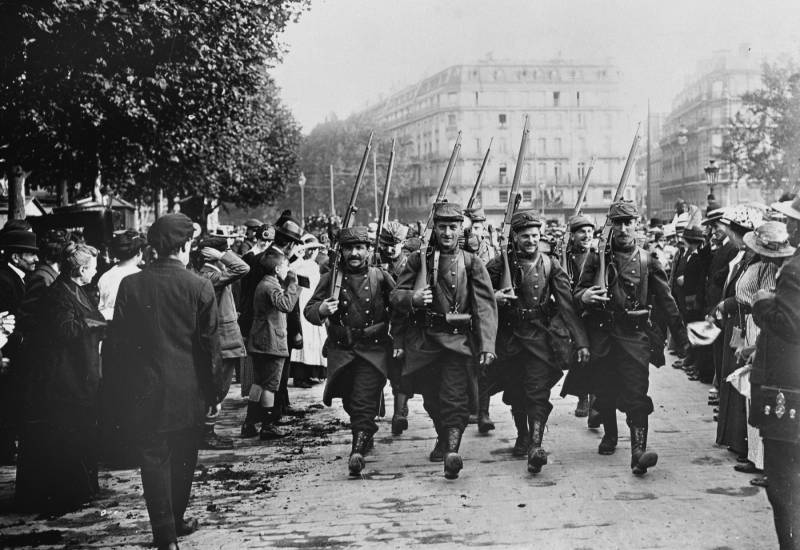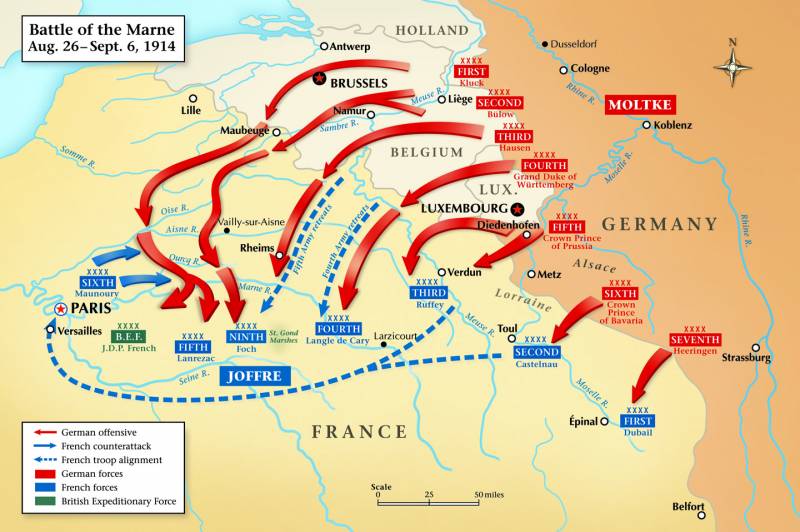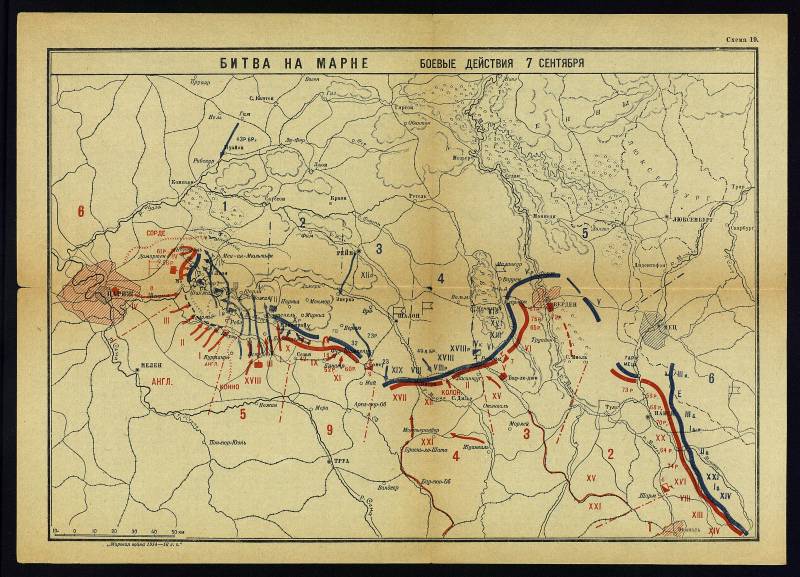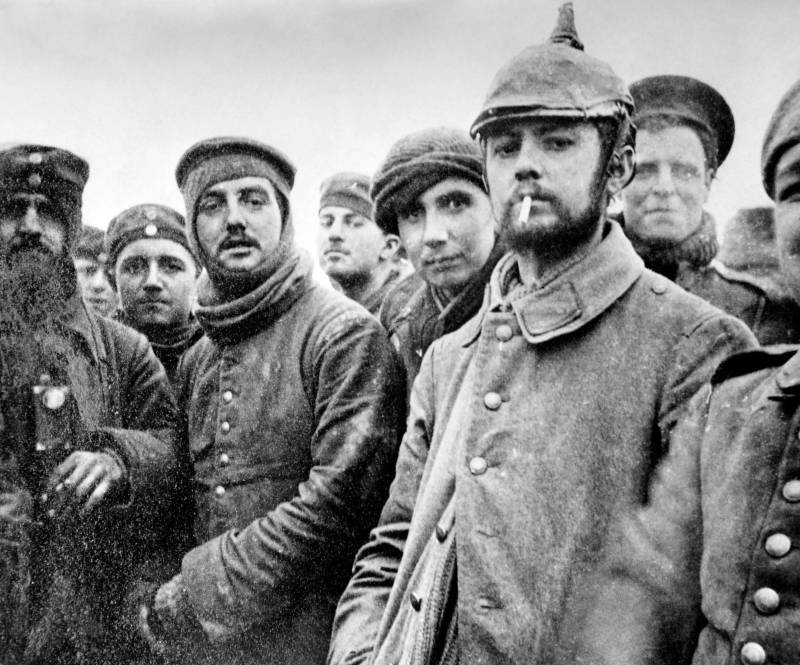Marxist analysis. World War I. The first salvoes of the war
Battle of the Marne
In the beginning, everyone was convinced that the war would be short. All the belligerent powers based their plans on this assumption.
The British did not even believe that there would be any need to send soldiers to the ground. Britain's contribution, in their opinion, will be limited to naval fleet. In fact, the mighty British navy saw little to no combat. It quickly became clear that the German army threatened to defeat the French and Belgian armies, and the British were forced to come to their aid. And it turned out that the war in Europe, as in the past, would be waged by "poor infantry."
But at first they did not understand this.
"We'll be home by Christmas" was a common misconception among soldiers of all armies. And it goes without saying that they will all return victorious. They were to experience a terrible lesson in the trenches and on the battlefields of the Marne and Somme, Tannenberg and Gallipoli. But that was still in the future.
The first battles of the war were different from the later bloody battles of attrition fought in the trenches. The beginning of the war was an extremely fluid affair, in which for the last time (at least on the western front) the cavalry played a prominent role.
The first battle of the Marne took place just forty-eight kilometers northeast of Paris, in the valley of the Marne River, and lasted from 6 to 12 September 1914. Following the Schlieffen plan developed before the war, the Germans hoped to win a quick victory in the West before turning to the East.
The people in Berlin were so confident of success that they believed the French would be out of the war within three weeks. It was wildly optimistic.
The Germans advanced rapidly towards Paris, while the French army retreated under their furious onslaught. By the first week of September, the French government had fled Paris. The German 1st and 2nd Armies (led by Generals Alexander von Kluck and Karl von Bülow, respectively) moved in parallel paths to the south, with the 1st Army slightly to the west and the 2nd Army slightly to the east.
Kluck and Bülow were ordered to take Paris with a single blow, supporting each other. But instead of heading straight for Paris, Kluk decided to pursue the exhausted, retreating French Fifth Army.
Intoxicated by his first successes, Kluk moved forward. His telegrams to Berlin were triumphant and overconfident, as if it were all just a pleasant stroll through the countryside. But, having opened a gap between the German 1st and 2nd armies, he substituted the right flank of the 1st army under the French counterattack.
On September 3, Kluck's 1st Army crossed the Marne River and entered the river valley. Her further path was stopped by a French counterattack.
Both the Germans and the French were exhausted by the long and fast march, but the French were closer to Paris and had the advantage of shorter supply lines, while the advancing German lines were stretched to breaking point.
It seemed impossible that a broken and demoralized army could turn around and fight, but that's exactly what happened.
The French fought with desperate courage. It was during this battle that Foch is said to have sent the famous telegram to Joffre:
[My center is losing, my right is retreating, the situation is great, I am attacking].
The German advance was abruptly halted, but at a terrible cost in human lives.
French troop losses (killed and wounded) were estimated at around 250. German losses were almost the same. The much smaller British force suffered 000 casualties.
The Germans retreated to the Aisne valley, where they prepared for a new battle. At the Battle of the Aisne, the Allied forces were unable to break through the German line of defense and the fighting quickly reached a stalemate. Neither side was willing to back down.
The German army was forced to abandon its idea of a quick victory and began to dig trenches for defensive purposes.
With the reflection of the German army on the Marne, the nature of the war underwent profound changes. At first, digging trenches was supposed to be only a temporary measure, but it marked a fundamental change in military tactics. The days of open war are over. Both sides are now bogged down in the mud and blood of the trenches. People remained locked in these underground lairs until the end of the war.
However, the revolutionary change in tactics did not immediately lead to a corresponding change in the mentality of the generals.
French commander-in-chief Joffre, even compared to many of the brutal and incompetent generals of the First World War, stands out as a brilliant example of a lack of military talent and humanity in equal measure. Here, mule-like stubbornness and idiotic inflexibility have replaced that genuine stubbornness and audacity, which are the necessary qualities of a great commander.
Firmly convinced of his absolute superiority over humanity, and in particular over his fellow officers, Joffre considered himself the savior of France. Foch said of him that despite his lack of originality, he never hesitated in making a decision and "he didn't know what France would do without him".
Showing complete indifference to the deaths of his own soldiers, Joffre constantly put pressure on them to go on the offensive. The French army was ordered to carry out a series of pointless pinpoint attacks, the only result of which was heavy casualties. The attacking units were mowed down by merciless rifle and machine-gun fire long before they reached the enemy trenches. Many victims were left to die a painful death, lying on no-man's land or dangling like a scarecrow on the enemy's barbed wire.
Christmas in the trenches
The German defeat on the Marne ended Berlin's dreams of a quick victory.
This also marked the end of Moltke's military career. He was fired immediately. But, in any case, the disappointment on the side of the Allies was even greater. The Germans, despite their defeat, had about one-tenth of the territory of France under their control. Moreover, the occupied territory included some of France's richest agricultural land, eighty percent of its coal, nearly all of its iron reserves, and most of its industry.
The Allies won the battle, but not the war, which has now led to a stalemate.
The first trenches were simply improvised structures, often just shell craters, in which frightened soldiers took refuge from the devastating hail of bullets. But they soon became more stable and complex, especially on the German side, where the soldiers enjoyed much better conditions than their French and British counterparts. Their trenches were deeper, better protected, and equipped with kitchens and other amenities.
All wars consist of short bursts of hectic activity, separated by long periods of "boredom."
The static nature of trench warfare led to a growing curiosity about what was happening on the other side. The proximity of the enemy meant that they could be heard, although rarely seen. The smells of their breakfast preparations wafted to the soldiers on the other side, who were housed in the same conditions of damp and cold as those. From time to time, loud conversations took place between the trenches, and in some cases even the exchange of various objects.
Thus, mutual respect began to develop, which paved the way for fraternization.
In the first months of the trench war, there was a kind of “live and let live” mood, when soldiers who were in close proximity to each other stopped fighting and entered into small fraternities. In some sectors, unofficial truces were established, allowing soldiers to leave the trenches and heal wounded comrades. Sometimes they came to a tacit agreement not to shoot while people were resting, exercising, or working in full view of the enemy.
On January 1, 1915, the Norfolk Chronicle and the Norwich Gazette published the following letter containing an eyewitness account of this:
But the entry must certainly be made in connection with the incident described in a letter from Private H. Scrouton, Essex, to relatives at Wood Green, Norwich. He's writing:
“As I told you before, our trenches are only 30-40 yards from the Germans. This led to a disturbing incident the other day. Our comrades had a habit of shouting at the enemy, and we were accustomed to receiving answers from them. We were told to enter into conversation with them, and this is what happened.
From our trenches: "Good morning, Fritz." (No answer). "Good morning, Fritz." (Still unanswered). "GOOD MORNING, FRITZ."
From the German trenches: "Good morning."
From our trench: "How are you?" "Good". "Come here, Fritz." "No. If I go, they'll shoot me. " “No, they won't shoot. Let's". "Go and get some cigarettes, Fritz." "No. You will go half way to us, and I will go to you. " "Good".
After that, one of our guys filled his pocket with cigarettes and climbed over the trench. The German crossed his trench, and pretty soon they met halfway and shook hands, Fritz took the cigarettes and gave cheese in exchange for them. It was nice to see the Germans standing at the top of their trenches, and the British too, with their caps waving in the air, all greeting each other.
About 18 of our men made it half way and met about the same number of Germans. This went on for about half an hour, when both sides returned to their trenches to fire at each other again.
The dangers inherent in this did not escape the generals. They were especially concerned about the approaching Christmas season.
On 5 December 1914 II Corps Headquarters [General Sir Horace Smith-Dorrien] issued an instruction to the commanders of all divisions:
Officers and soldiers sink into a military lethargy from which it is difficult to awaken them when the moment comes again for great sacrifices ... The attitude of our troops is easy to understand and to a certain extent evokes sympathy ...
However, such an attitude is most dangerous, since it discourages the initiative of the commanders and destroys the offensive spirit in all ranks ... Therefore, the corps commander instructs the division commanders to instill in subordinate commanders the absolute necessity of encouraging the offensive spirit ...
Friendly relations with the enemy, unofficial armed actions, no matter how tempting and funny they may be, are absolutely prohibited.
But such prohibitions were powerless to stop the tendency to fraternization.
Snippets of chants that circulated throughout the trenches during the week leading up to Christmas encouraged German and British soldiers to exchange seasonal greetings and songs between their trenches.
Finally, they began to emerge from their relatively safe trenches and establish direct contact with the other side, exchanging gifts and souvenirs.
Instinctively, the soldiers realized that the people in the other trenches were workers just like themselves, involved in senseless slaughter to protect the interests of kings, lords and capitalists. Many soldiers on both sides spontaneously walked into the no-man's trenches (the area between the German and the British), where they exchanged food and cigarettes and even held joint funeral ceremonies, sometimes with meetings ending with the singing of hymns.
The Germans began by placing candles on their trenches and Christmas trees, then continued the celebration by singing carols, to which the British responded with their own songs.
On Christmas Eve 1914, both sides declared an unofficial truce and a football match was played in No Man's Land. In some places, the truce lasted a week. It is estimated that up to 100 people took part.
However, the officer caste on both sides was enraged by this spontaneous movement towards fraternization with the "enemy".
The following Christmas, sentries on both sides were ordered to shoot any soldier who tried to spread the Christmas message of "peace on earth and good will to all people." Any soldier who sticks his head over the parapet will receive a small Christmas present in the form of a bullet to the head.
The goal of the ruling class is always to divide the working class along national, racial, linguistic and other lines. This is more evident in war than in peacetime.
The generals were horrified by the instinctive fraternization of the workers.
The deployment of snipers along the front line was undertaken precisely to prevent further fraternization.
- Vladimir Zyryanov
- https://www.cup.com.hk http://www.historynet.com https://gwar.mil.ru https://img.buzzfeed.com




Information